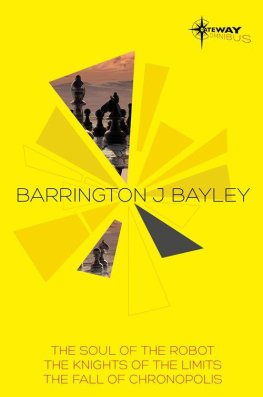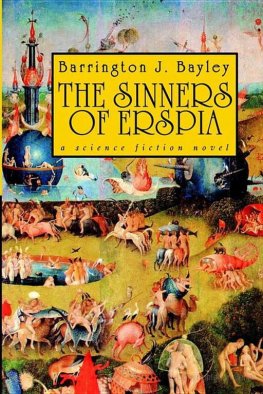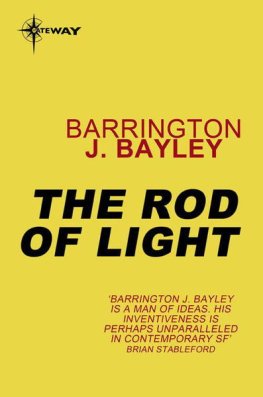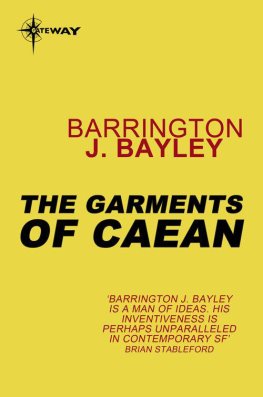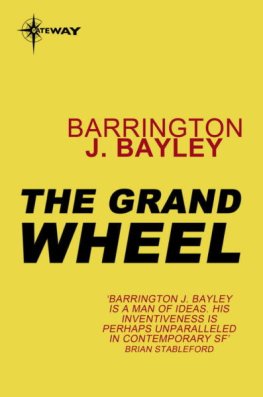Barrington J. Bayley
SF GATEWAY OMNIBUS
THE SOUL OF THE ROBOT
THE KNIGHTS OF THE LIMITS
THE FALL OF CHRONOPOLIS
INTRODUCTION
from The Encyclopedia of Science Fiction
Barrington J. Bayley (19372008) was a UK writer active as a freelance under various names in the 1950s, often working as P. F. Woods and (with his editor and colleague Michael Moorcock) as Michael Barrington. During his prolific early years in particular, he wrote juvenile stories, comics, picture-strips and features as well as sf, which he began to publish with Combats End for Vargo Science Fiction Magazine #4 in 1954. The best of his early work appears in The Seed of Evil (coll 1979), a retrospective assembled to honour his substantial career. All his sf novels were published under his own name, beginning with Star Virus (1970). This complex and somewhat gloomy space epic, along with some of its successors, had a strong though not broadly recognized influence on such UK sf writers as M. John Harrison. Perhaps because Bayleys style is sometimes laboured and his lack of cheerful endings is alien to the expectations of readers of conventional Space Opera, he never received adequate recognition for the hard-edged control he exercised over plots, whose typically intricate dealings in Time Paradoxes, and their insistent highly focused metaphysical drive, make them some of the most formidable works of their type. Though Annihilation Factor (1972), Empire of Two Worlds (1972) and Collision Course (1973; vt Collision with Chronos 1977) which utilizes the time theories of J. W. Dunne are all variously successful, probably his most fully realized Time Paradox or Time Police space opera is The Fall of Chronopolis (1974) (see below).
The Robot Jasperodus series comprising The Soul of the Robot (1974; revised 1976) (see below) and its loose sequel The Rod of Light (1985) marked a change of pace in its treatment of such Robot themes as the nature of self-consciousness; and The Garments of Caean (1976) utilizes some fairly sophisticated cultural Anthropology in a space-opera tale at whose heart lies a subversive device: a depiction of sentient clothing which (more or less literally) makes the man. But perhaps the most significant work Bayley produced in the 1970s was short fiction, most of it collected in The Knights of the Limits (1978) (see below); much of his last fiction (at least twenty further stories) appeared in Interzone and remains uncollected. Later space operas The Grand Wheel (1977) (about Psi Powers), Star Winds (1978), The Pillars of Eternity (1982), The Zen Gun (1983), The Forest of Peldain (1985), The Sinners of Erspia (2002) and The Great Hydration (2005) continued to conceive of the universe as a kind of polished machine. Bayley continues to be seriously underestimated, perhaps because most of his best work appeared as paperback originals, most of these being published in America, a land he never visited or showed any inclination to depict in his fiction. His UK following, though not large, remained intensely loyal until the end of his life. They were right to keep his name alive.
The Fall of Chronopolis, which is the first tale assembled here, climaxes Bayleys early career in its wide-ranging but impersonal exuberance, lacking any attempt to cosy up to the reader. Even at its most outrageous, the story reads like polished reportage: a characteristic that marked Bayleys work throughout, a sense that the worlds he described were so absolutely real that he needed only to report the latest news from the front. In this novel, which is a pure Time Opera, the Chronotic Empire jousts through time and space against a terrifying adversary in doomed attempts to maintain a stable reality; at the crux of the book it becomes evident that the conflict is eternal, and that the same forces will oppose one another through time forever, in one Alternate World after another.
Though it was published in the same year (1974), The Soul of the Robot, the second novel here presented, marks a new stage in Bayleys career. Everything one might say about The Fall of Chronopolis applies here; what is added is a focus on characters in this case robots who own deep strangeness reflects the worlds they occupy. The effect is strangely moving and unsettling: as though we were eavesdropping on creatures far removed from us, but still intimate. The overall tale makes complex play, as before, with a number of philosophical Paradoxes, though Bayleys touch here is relatively light and elliptical, approaching the surreal lightness achieved by John T. Sladek in his own robot novels.
The Knights of the Limits may contain stories that seem bleak, but in the end Bayleys architectural ingenuities (and the human/machine interfaces he was now able to depict with such ease) are what we remember. We remember the dark glittering intricacy of his creations, which glow like orreries in the minds eye. Bayley was a cleansing writer, he cleared the eye, and sharpened the mind. We are very lucky to have him here.
For a more detailed version of the above, see Barrington J. Bayleys author entry in The Encyclopedia of Science Fiction: http://sf-encyclopedia.com/entry/bayley_barrington_j
Some terms above are capitalised when they would not normally be so rendered; this indicates that the terms represent discrete entries in The Encyclopedia of Science Fiction.
For Mike Moorcock the eternal champion!
Out of pre-existence Jasperodus awoke to find himself in darkness.
Seldom can a sentient being have known such presence of mind in the first few seconds of its life. Patiently Jasperodus remained standing in the pitch-blackness and reviewed his situation, drawing upon the information that had been placed in his partially-stocked memory before his birth.
He became aware that he stood unaided inside a closed metal cabinet. The first intelligent action of his existence was to grope forward with his right hand until he found the knob on the inside of the cabinets door. He turned, and pushed. Then he stepped out to inspect the scene that met his eyes.
A man and a woman, well worn in years and dressed in smudged work smocks, stared at him shyly. They stood close to one another, like a couple who had grown old in each others company. The room smelled faintly of pine, of which wood workbenches and other furniture were fashioned: chairs, cupboards, a table and an assembly rack. Cluttered on these, as well as on floor, benches and hooks, was a disorderly array of components and of the curious instruments betokening the trade of an electronics craftsman.
Although the room was untidy and somewhat shabby, it had a warm, homely atmosphere. Its disorder was that of someone who had his own sense of method, and Jasperodus already knew how efficacious that method was.
His glance went back to the elderly couple. They, in turn, looked at him with expressions that tried desperately to mask their anxiety. They were gentle and blameless people, and in Jasperodus eyes rather pathetic since their eager expectations were doomed to disappointment.
We are your parents, the wife said in a hesitant, hopeful voice. We made you. You are our son.
She had no need to explain further, for Jasperodus knew the story: childless, and saddened by their childlessness, the couple had chosen this way of giving their lives issue. They looked to Jasperodus now to bring them as much joy and comfort as an organically born flesh-and-blood child might have done.
But like many an ungrateful son, Jasperodus had already made his decision. He imagined better things for himself than to spend his life with them. Jasperodus, the hulking, bronze-black all-purpose robot they had created, laughed harshly and moved purposively across the room to the door. Opening it, he walked out of their lives.

